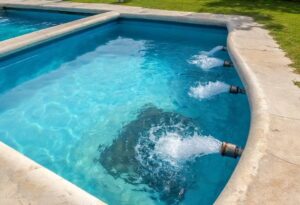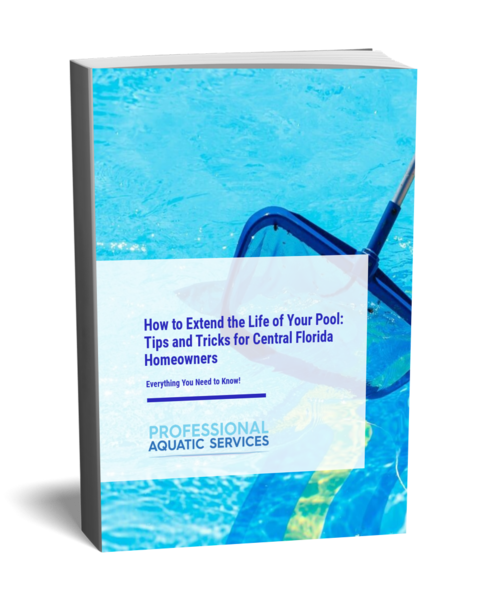Why is your pool pump suddenly making loud noises, losing suction, or constantly tripping breakers? When pool pumps burn out, circulation stops, leading to cloudy water, algae growth, and potential damage to other pool components.
Common culprits include clogged pump baskets, air leaks, overheating, and frequent power surges. Ignoring early warning signs like a pool pump losing suction, tripping breakers, or making unusual noises can result in a burned-out motor that requires costly replacement.
Many pool owners unknowingly contribute to pump failure by running a dry pump, neglecting skimmer baskets, or allowing large debris to block the system. Addressing these issues early prevents costly repairs.
Learn the common causes and the proper repair solutions to ensure your pool operates efficiently all year long.
Table of Contents
ToggleCommon Causes of Pool Pump Burnout
A pool pump is designed to keep water circulating efficiently, but when a pool pump burns out, it’s often due to preventable issues. Over time, wear and tear, combined with poor maintenance, can lead to serious pool pump repair trouble. From electrical failures to overheating, these issues can stop your pump and lead to costly repairs.
Understanding the common pool pump burnout causes can help prevent major damage. Whether it’s a clogged impeller, an improperly sized pump motor, or debris-filled pump baskets, identifying these issues early helps you fix your pool pump before permanent damage occurs.
1. Electrical Issues
Electrical failures are a common reason for pump burnout. A pump that trips breakers issue may indicate an overloaded circuit, faulty wiring, or a failing pump motor. Power surges wear down the motor over time, leading to early failure.
Common electrical issues include:
- Voltage fluctuations stressing the electric motor.
- Loose wiring connections interrupting power flow.
- Undersized breakers causing frequent trips when the pump is running.
2. Overheating
A pool pump needs proper air circulation to function efficiently. When trapped heat builds up, it can lead to motor failure, causing the pump to stop working. Poor ventilation, direct sunlight exposure, or a pump area with restricted airflow can all contribute to overheating.
Causes of overheating:
- Blocked vents restricting air flow to the motor.
- Running the pump during peak heat hours increases temperature stress.
- Excessive heat can cause plastic plumbing components to warp and shrink, reducing pump efficiency.
3. Clogged or Restricted Water Flow
A clogged impeller, blocked pump basket, or stuck weir door can reduce water circulation. If the pump isn’t getting enough water, the motor works harder, increasing the risk of burnout.
Blockages may come from:
- Debris buildup in skimmer baskets and replumbing components.
- A damaged pump basket restricting water flow.
- Closed or partially closed valves, limiting circulation.
4. Incorrect Pump Sizing
Using the wrong pump size can cause excessive strain on the system. An oversized pump creates too much pressure, potentially damaging pipes and valves. An undersized pump struggles to circulate pool water effectively, leading to overuse and burnout.
Sizing issues include:
- A pump running at an improper speed for the plumbing system.
- Incoming pipes being too small for the pump’s output.
- Excess pressure damaging seals and impellers over time.
5. Running the Pump Dry
A pump that runs without enough water can overheat and fail. Air leaks in drain plugs, pump lids, or pump pot baskets can introduce air into the system, reducing suction and damaging the motor.
Common dry-running causes of pool pump burnout:
- Low water levels from evaporation, leaks, or excessive backwashing.
- Air leaks in suction-side connections, including loose pump lids or cracked O-rings.
- Improper priming, causing the pump to run dry and overheat.
- Clogged skimmer baskets restricting water intake.
- Blocked or partially closed valves, limiting water flow to the pump.
Regular maintenance and professional inspections can prevent these issues and extend your pump’s lifespan.
6. Worn-Out Bearings or Motor Issues
Over time, worn motor bearings and internal wear can cause a noisy pump and lead to complete failure. Bearings lose lubrication, increasing friction and overheating the pump motor.
Signs of motor failure include:
- Grinding or squeaking noises from the pump motor.
- Pump losing suction due to motor inefficiency.
- A completely burned-out motor leading to total pump failure.
Professional Pool Pump Repair Solutions

Ignoring common pool pump burnout issues can lead to costly damage or total system failure. A failing pump disrupts water circulation, affects filtration, and can strain other pool components. When pool pumps burn out, professional intervention is essential to diagnose and resolve the problem before it worsens.
The right repair approach depends on the root cause. Below are common pool pump repair scenarios and the professional solutions required to fix your pump safely and efficiently.
Issue | Professional Solution |
Electrical Failures | A technician inspects wiring, checks voltage stability, and ensures circuit protection. Breaker adjustments or rewiring may be necessary. |
Overheating | A professional clears debris around the service site icon logo and ensures proper ventilation. Adjusting run times prevents excessive heat exposure. |
Clogged or Restricted Water Flow | Experts clean skimmers, filters, and pump baskets while inspecting pipes and valves for blockages that restrict circulation. |
Incorrect Pump Size | A pool service site icon specialist evaluates the system and selects the right pump capacity to prevent performance strain. |
Dry Running & Air Leaks | Professionals check for leaks in seals, pipes, and pump lids, ensuring the pump is properly primed and water levels are maintained. |
Worn Bearings or Motor Issues | A technician diagnoses motor failure, lubricates or replaces bearings, and determines whether a motor replacement is required. |
A failing pump should never be ignored or repaired without expertise. Seeking professional pool pump repair ensures repairs are done correctly, preventing further damage and keeping your pool running efficiently.
When to Call a Professional for Pool Pump Repair
A failing pump doesn’t always stop working immediately—it often gives warning signs before completely shutting down. Ignoring these signs can lead to pricey repairs or a full pump replacement when pool pumps burn out.
Seeking professional repair at the right time can prevent more damage and extend the pump’s lifespan.
- Unusual Noises – Grinding, screeching, or loud humming often indicate motor or bearing failure.
- Frequent Tripped Breakers – Electrical problems, overheating, or power fluctuations may overload the system.
- Loss of Suction – Air leaks, clogged pump baskets, or impeller blockages can restrict water flow.
- Overheating or Shutting Off – Poor air circulation, motor failure, or ventilation issues can cause excessive heat buildup.
Delaying repairs increases the risk of total pump failure. A pool pump service expert can diagnose and fix problems early, preventing expensive replacements and ensuring smooth operation.
Stay Proactive: Know the Causes of Pool Pump Burnout
Pool pumps burn out due to overheating, clogged impellers, low water levels, or electrical issues. Taking aside the early warning signs can lead to costly repairs or full replacements. DIY fixes often make problems worse, risking more damage and voiding warranties.
Professional repair ensures your pump runs efficiently and lasts longer. Experts from Professional Aquatic Services can diagnose issues before they escalate, saving you time and money. Routine inspections catch small problems early, preventing burnout and unexpected breakdowns.
Don’t wait for failure—schedule a professional inspection today to prevent costly breakdowns and extend your pump’s lifespan.

